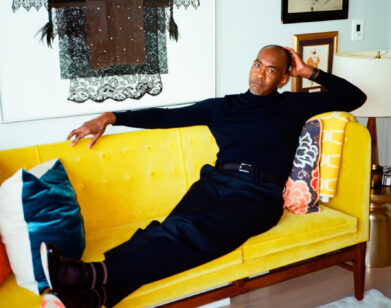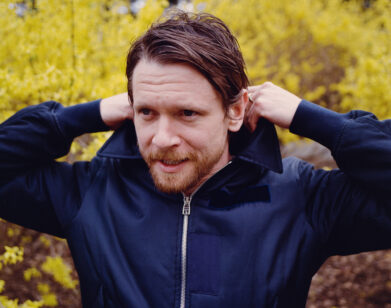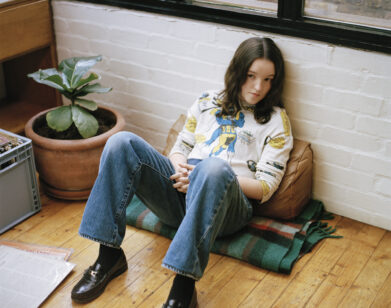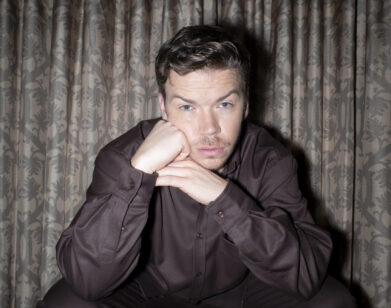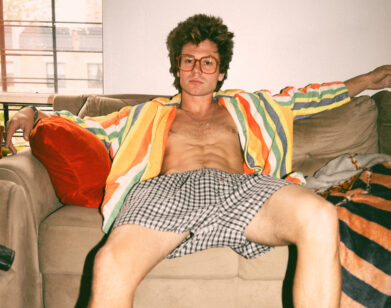Anika Noni Rose, On Stage and On Screen

ABOVE: ANIKA NONI ROSE AT THE EMPIRE HOTEL IN NEW YORK, APRIL 2014. EARRINGS: TACORI. PHOTO: YANN BEAN. MAKEUP: MICHAEL ANTHONY. HAIR: CYNTHIA ALVAREZ.
A Raisin in the Sun is a remarkable play, both in its prescience and its history. Written by Lorraine Hansberry when she was just 28, the play was initially performed in New York in 1959. It was the first Broadway play written by a black woman, the first Broadway play directed by a black director, and the first Broadway play with a largely black cast.
The play revolves around a family living in a small, dilapidated Chicago apartment in the late 1950s. There are no superfluous characters; all of the members of the Younger family have their or her own ambitions and flaws, and their own reasons to be angry with their lots in life. Lena, the matriarch, is trying to do what is best for her children, who seem to be moving further and further away from the ideals of her generation. Walter, Lena’s son, feels emasculated by society and is frantic to assert his autonomy. Ruth, Walter’s wife, takes care of everyone else and gets little in return. Beneatha, Walter’s sister, longs for a freedom denied to her by her race and her gender. The Youngers are a collection of individual tragedies united under one roof.
A Raisin in the Sun is currently in its second Broadway revival at the Ethel Barrymore Theatre. Through the lens of 2014, Beneatha, played by Broadway veteran Anika Noni Rose, is perhaps the most sympathetic character. “Lorraine Hansberry was so amazingly forward thinking. Beneatha was her—that was her writing herself,” explains Rose. “The play is a feminist play, and I think a lot of people don’t really realize that,” she continues. Today, “We are more Beneatha than we are Lena.” Performing alongside Rose are Denzel Washington (Walter), Sophie Okonedo (Ruth), and LaTanya Richardson Jackson, everyone, Rose in particular, holds his or her own.
The play is not Rose’s only exciting project. The actress, who made a name for herself in theater, has several noteworthy upcoming films including Sundance’s Imperial Dreams, Half of a Yellow Sun with Thandie Newton and Chiwetel Ejiofor, and A Day Late and a Dollar Short with Whoopi Goldberg, which airs this weekend on Lifetime.
We spoke with Rose on a rainy afternoon in New York.
EMMA BROWN: Do you remember your first theater experience?
ROSE: Yes. Well, my very first, was when I was two. [laughs] I was playing an angel, of course, in a church play—not my church, I was invited to a different church by my aunt. My cousin was playing “The Little Drummer Boy,” which was my favorite song. He went up there to sing and the music played and he looked down to the audience and he froze and couldn’t sing. I don’t remember doing this—there are pictures—but apparently I walked up, moved him out of the way, and sang the song because it was my favorite song and clearly he was having a problem. I was not invited back to a church play until they figured out I was actually a performer and that was 12 years later. [laughs]
BROWN: But you saved the production.
ROSE: I did! But that wasn’t really appreciated.
BROWN: So did you always know that you wanted to be an actor?
ROSE: I had no desire. At that time, I wasn’t thinking of it as “performance.” It was just, “Oh, I know that song!” I loved that song; it was my favorite Christmas song when I was little. I didn’t realize that I was a performer until the show that was 12 years later, which was Fame. Somebody came and directed that at my high school. I approached it with sort of the same sensibility— “Oh, I know that music. I’m going to go audition.” I ended up being in it and I sang and it was mind-altering—to me, to my parents, who had never heard me sing like that. It put a stop to everything else that I was doing—every sport that I played, every instrument, it was all dropped because nothing felt like that. I feel really lucky that I found my passion at that point. There are people who are adults who don’t know what their passion is and go through life doing “a job.”
BROWN: Are there days when you just don’t want to go to work?
ROSE: There are days when you’re like, “Ughhhh.” [laughs] There was a day this weekend—it was so beautiful outside, and we had two shows. Do I love it less? No. But yes, you look at the river [thinking], “Somebody’s riding a bike and I’m going to my cave.” [laughs] But once the show starts and you get out there, it’s an amazing feeling.
BROWN: How did you get your actor’s equity card?
ROSE: I think I got my card straight out of grad school. I did a show called Insurrection: Holding History, by Robert O’Hara, at the Gehry Theater in San Francisco.
BROWN: How long have you been based in New York?
ROSE: I’ve been in New York for 14 years. I would never leave for good. The city is so much more alive than so many other places, and I think it is fodder for performers. You see so much; research is thrown at you everywhere you go. There was a rat on the subway train recently—you saw the video online—that’s fantastic! That’s something that is so specific to this city, the way you are pushed up against humanity, and the animal kingdom, whether you want to be or not. [laughs] It’s a stimulating city —physically, intellectually, culturally. It never ceases to thrill me.
BROWN: Can New York audiences keep up with all that is being offered to them—the quality of theater?
ROSE: I think the New York theater audience is very savvy. Sometimes you get newbies who think they’re going to be watching Smash onstage, and sometimes you have people who have been coming to theater for years. It’s the combination of those people in an audience that makes for a pretty amazing night—their ability to give each other permission to react and enjoy, in a way that maybe they wouldn’t if they weren’t sitting next to each other.
BROWN: When I came to A Raisin in the Sun, people laughed in some serious and emotional moments, which I found very odd. Is that common?
ROSE: It is common, but it’s different every night. Sometimes people laugh because they are uncomfortable, and they don’t know what else to do. Sometimes people laugh because they can’t separate a character from an actor, and so that strikes them in a different way. And sometimes people don’t know the history of what it is that they’re watching; they don’t know the pain of a moment, so they’re laughing because it’s comical physically. But I find that they will start out laughing, but the shoe always drops. And that’s the important part.
BROWN: I didn’t realize that Lorraine Hansberry was so young when she wrote the play, and that she died at such a young age.
ROSE: It’s unbelievable how young she was and how much of a genius she was. I was reading Lorraine’s autobiography, and she talks about editing a play—she would cut it down to a point where every line meant something, every line was important. That’s a hard thing for a writer to do, but that was her goal. I think that’s scary and honorable and amazing—sometimes you must write something that you think is so beautiful and fabulous. It must be so hard to say, “We’re going to throw the baby out.”
BROWN: Does that make it more difficult as an actor, when every line has weight?
ROSE: No, it doesn’t. We can’t say every line as if it has weight, but what we want to do is be true to the meaning of each line, whatever it is. Even the lines that are throwaway may come back later. Walter Lee and Beneatha often say similar things, and part of it is the genius of Lorraine—these people are not the same people; they don’t have the same goals, but they are in the same family, so the same words will come out of their mouths. Within scenes of each other, Beneatha and Walter both say, “Mama, you don’t understand,” and yet their journeys are very different.
BROWN: Can you tell me a bit about your character in Half of a Yellow Sun?
ROSE: I play Kainene, and I’m Thandie Newton’s fraternal twin. We are young Nigerian women who are very moneyed and very educated—educated in British schools in Nigeria and then at universities in the UK. We find ourselves in the middle of a war, that, like wars sometimes do, you heard the rumblings of it, but you didn’t know. It felt like it was unexpected, but it was coming. It’s really about their relationship with each other, their relationship with their significant others, and also the love that they have for their country. Chiwetel Ejiofor is in it, and he plays Thandie’s love interest. I am really, really proud and excited about this piece.
BROWN: Chiwetel has been acting steadily—and acting well—for a long time. But now, all of a sudden—
ROSE: The blow-up happens. They’re like, “Overnight!” [laughs] I’m really glad for him. It’s yeoman’s journey, this job. Some people blow up overnight, and some people blow up overnight and fizzle out the next week. And then some people are in it for the marathon, and I think we got a lot of marathon runners in this film.
BROWN: And then Day Late and a Dollar Short is premiering this weekend.
ROSE: Yes! It’s a Terry McMillan book that was brought to TV and Lifetime is going to be airing it on April 19th. I play Whoopi Goldberg’s daughter, with Tichina Arnold, Mekhi Phifer, and Kimberley Elise.
BROWN: When you’re working with Whoopi, do you ever get starstruck?
ROSE: No. [laughs] I don’t really do starstruck. The only time I really got starstruck, and it shocked me, was when I sang for Julie Andrews. I sang “Climb Every Mountain” and then I met her afterwards. I went up to her and I was really excited. I was not really thinking anything of it, except I was about to meet Mary Poppins! I went to say hi, and she was like, “That was so lovely,” and I started to cry. [laughs]
But I don’t generally, ’cause we’re there to do the same job, and we’re there to do it together and create the best project that we can. If you’re walking around googly-eyed, that’s not going to assist you in what you need to do. [laughs] But I do get very thankful for the opportunities that I’ve had to work with people who inspire me. And Whoopi was one of those people. She had a one-woman show on HBO a million years ago, and I remember seeing it as a little kid and being mind-blown by it—imitating her and her characters, and walking around doing her characters. It was a great inspiration to me as an artist at the time, even though I didn’t realize at the time that that was what it was.
A DAY LATE AND A DOLLAR SHORT AIRS TOMORROW, APRIL 19, ON LIFETIME. A RAISIN IN THE SUN IS CURRENTLY IN SHOWS AT THE ETHEL BARRYMORE THEATRE. HALF OF A YELLOW SUN WILL COME OUT THIS SUMMER.

